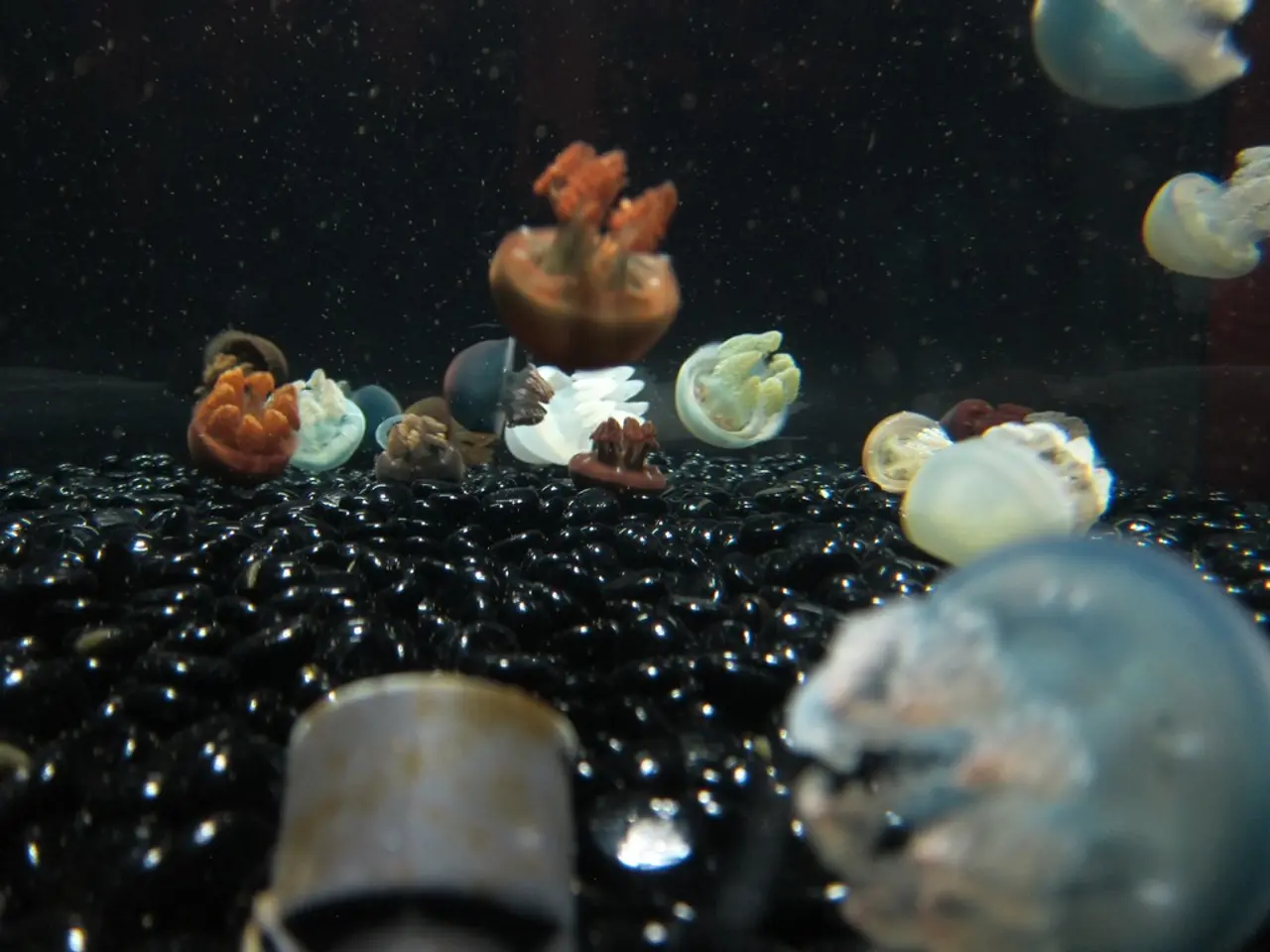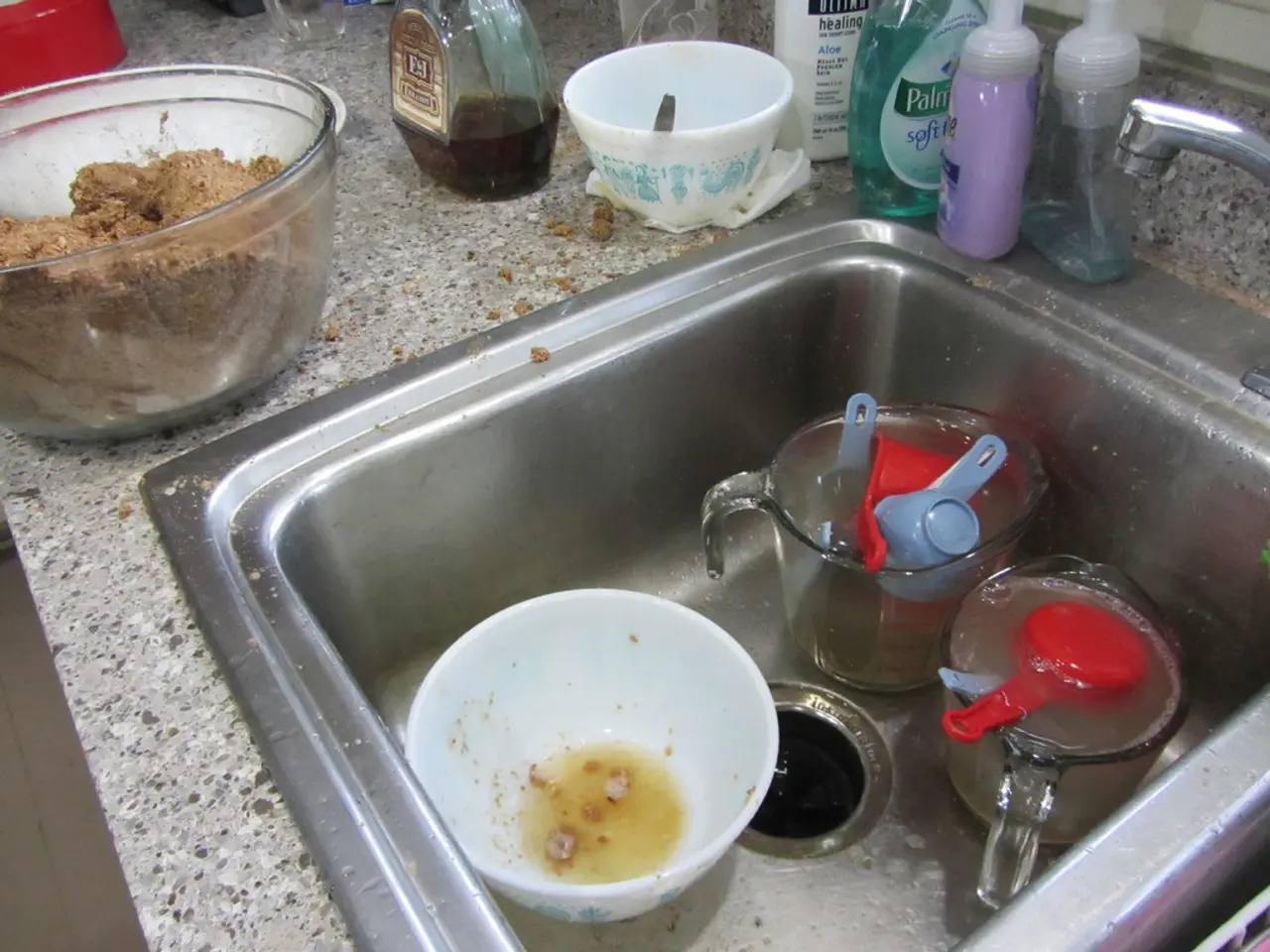Beach-dwelling 'flesh-consuming bacteria' can prove deadly. Safety measures explained.
In warm water environments, two potentially harmful organisms - Vibrio vulnificus and Naegleria fowleri - can pose risks to swimmers and seafood enthusiasts. To help reduce the risk of infection, it's essential to follow some key precautions.
For Vibrio vulnificus, a bacterium often associated with saltwater and seafood, the primary focus is on avoiding exposure and maintaining good hygiene. **Avoid swimming in saltwater or brackish water if you have open wounds, cuts, or sores.** If you sustain a cut while in the water, exit immediately to reduce infection risk. **Cover wounds with waterproof bandages** before exposure to coastal waters or seafood to protect from bacteria entry. **Rinse off thoroughly after swimming in ocean water** to remove bacteria on the skin. **Cook shellfish thoroughly** to kill Vibrio bacteria, especially oysters, clams, and mussels. **Prevent cross-contamination:** Keep raw seafood separate from cooked foods and other foods to avoid spreading bacteria. **Wash hands thoroughly after handling raw seafood**. If wounds become infected (redness, swelling, pain, pus) or if you develop fever, chills, or fatigue after swimming or consuming seafood, seek medical attention promptly. Persons with weakened immune systems, liver disease, or chronic illnesses should be particularly cautious, as they are at higher risk for severe Vibrio infections.
Naegleria fowleri, often referred to as the "brain-eating amoeba," is an amoeba found in warm freshwater. To avoid this dangerous organism, **avoid swimming or jumping into warm freshwater bodies, especially lakes, hot springs, or untreated warm freshwater, particularly during summer months or in warm climates.** Keep your head above water or use nose clips to prevent water from entering the nasal passages, as infection occurs when amoebae enter through the nose. **Avoid stirring up sediment in shallow warm freshwater**, where the amoeba is more likely to be found. **Do not use untreated or tap water for nasal rinsing or sinus irrigation; use sterile or distilled water instead.**
General swimming and seafood safety tips include **checking local health advisories** about water quality and bacterial warnings before swimming. **Immediately disinfect any wounds after water exposure**, using antiseptics, especially if injury occurred in coastal or freshwater bodies. **Avoid raw or undercooked seafood**, especially shellfish, during vacation in warm coastal areas.
By following these measures, you can significantly reduce your risk of Vibrio vulnificus and Naegleria fowleri infections during recreational activities and seafood consumption in warm water environments. The Centers for Disease Control and Prevention (CDC) reported about 40 infections nationwide from 2011 to 2022. Stay safe and enjoy your time in the water!
- Maintaining good hygiene is crucial when dealing with Vibrio vulnificus, a bacterium often linked to saltwater and seafood.
- Avoid swimming in saltwater or brackish water if you have open wounds, cuts, or sores to reduce infection risk.
- Exit the water immediately if you sustain a cut while swimming to minimize Vibrio vulnificus infection.
- Cover wounds with waterproof bandages before exposure to coastal waters or seafood to protect from bacteria entry.
- Rinse off thoroughly after swimming in ocean water to remove bacteria on the skin.
- Cook shellfish thoroughly to kill Vibrio bacteria, especially oysters, clams, and mussels.
- Prevent cross-contamination by keeping raw seafood separate from cooked foods and other foods to avoid spreading bacteria.
- Wash hands thoroughly after handling raw seafood to eliminate bacteria.
- If wounds become infected or if you develop fever, chills, or fatigue after swimming or consuming seafood, seek medical attention promptly.
- Persons with weakened immune systems, liver disease, or chronic illnesses should be particularly cautious, as they are at higher risk for severe Vibrio infections.
- Naegleria fowleri, known as the "brain-eating amoeba," is an amoeba found in warm freshwater.
- To avoid Naegleria fowleri, avoid swimming or jumping into warm freshwater bodies, especially lakes, hot springs, or untreated warm freshwater.
- Keep your head above water or use nose clips to prevent water from entering the nasal passages.
- Avoid stirring up sediment in shallow warm freshwater where the amoeba is more likely to be found.
- Do not use untreated or tap water for nasal rinsing or sinus irrigation; use sterile or distilled water instead.
- Checking local health advisories about water quality and bacterial warnings is essential before swimming.
- Immediately disinfect any wounds after water exposure, using antiseptics, especially if the injury occurred in coastal or freshwater bodies.
- Avoid raw or undercooked seafood, especially shellfish, during vacation in warm coastal areas.
- By following these measures, you can significantly reduce your risk of Vibrio vulnificus and Naegleria fowleri infections during recreational activities and seafood consumption in warm water environments.
- The Centers for Disease Control and Prevention (CDC) reported about 40 infections nationwide from 2011 to 2022.
- Stay safe and enjoy your time in the water!
- Climate change poses threats not just to health but also to the environment.
- Rising global temperatures increase the range and activity of harmful organisms, such as Vibrio vulnificus and Naegleria fowleri.
- Promoting climate-change mitigation efforts is essential to ensure a safe and healthy future for generations to come.
- Mental health is an integral part of overall health and wellness.
- Skin care is a crucial aspect of maintaining good mental health.
- Therapies and treatments, such as cognitive-behavioral therapy and mindfulness practices, can help manage mental health conditions.
- Nutrition plays a significant role in mental health and well-being.
- A healthy, balanced diet is essential for managing mental health conditions and promoting overall mental wellness.
- In the workplace, workplace-wellness programs can help promote mental health and encourage a positive and productive working environment.




